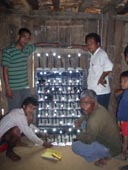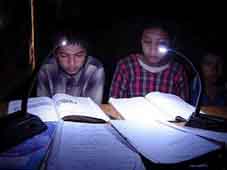| Case: Nepal - Charging Centre for Solar Lamps | |
 |
 |
The Case of Solar Tuki with Solar Mass Charging Station In Kantipuri Village,
Chitwan
Reviewed
by Ganesh
Ram Shrestha, Centre for Rural Technology–Nepal (CRT), INFORSE
National Focal Point.
Environmental Camps for Conservation Awareness (ECCA) is one of the leading
organizations in the sector of social mobilization and community development,
established in 1987 as a non profit, non political, non government organization.
It implements various programmes so as to raise the quality of life through
wise-use of available local resources and application of alternate and renewable
technologies. The case study presented below is on a project implemented by
ECCA.
Promotion of Alternative Energy- Solar Tuki
Solar Tuki is a portable solar lamp unit with white LED bulbs designed to provide
rural Nepal with an alternative to traditional kerosene tuki (lamp).
With the increasing popularity of solar tuki in the rural areas, the demand
of solar tuki sets are in raise. As per the demand and need of solar tuki in
the rural areas, a community charging center model was developed to provide
the benefit for the community who are not in the state of purchasing solar
tuki set. In this system, a number of solar tukis are charged at once through
a bigger solar panel, thus reducing the cost of individual solar panel for
an individual household.
At Kantipur Village (a remote village settlement of Chitwan), Chitwan district,
Nepal, households were not in the situation of purchasing individual solar
tuki sets, hence, a community charging center was established at the end of
March 2010. 48 households benefited through distribution of 60 pieces of solar
tukis and establishment of the center.
Most of the villagers, particularly women seem very happy after the establishment
and use of solar tuki. The main reasons behind their happiness are saving of
money, saving of time to purchase kerosene, health benefit and brighter light
of solar tuki. As per Mrs. Januka Sunar, she has saved NRs 350/- per month
spent on kerosene. In addition, brighter and better light than kerosene lamp,
easy use during preparation of evening meals and one and half hour of time
and energy saving for purchasing kerosene which she has now been using for
income generation through poultry farming. In general, all households of the
village using solar tuki are being benefited.
Mr. Subash Sunar (16 yrs) studying at grade 10 and Mr. Dinesh Gayak (14 Yrs)
studying at grade 8 of Jana Jeevan Ma Vi, Kharkatta, Chitwan has been using
solar tuki since April 2010. Prior to the use of solar tuki, they used kerosene tuki as the only source of light during evening hours. They used it mainly
for their study purpose. The students were irritated with the particulate matters
and black soot particulates emitted by the kerosene tuki, which had created
various health problems like eye irritation, cough problems.
When solar tuki was introduced in the village to replace the kerosene lamp,
the students were excited to use it. According to the students, bright light
compared to kerosene tuki, smokeless, no fear for fire hazard and benefit for
using continuously light are the main encouragement and attraction towards
the use of solar tuki. Due to which, the students are able to increase their
study hours in the evening by 2 hours after solar tuki were introduced in the
village. The shopping time of one and half hour to purchase kerosene for lighting
their house in the evening has been utilized in other activities.
More
information:
ECCA, www.ecca.org.np
CRT, www.crtnepal.org/
 |
|
| Energy Access | |
| Contents Solutions to provide energy access for all Cases: |
|
| AFRICA | |
| · Kenya: Decentralizing Power Policy | |
| · Kenya: Afforestation for Charcoal | |
| · Mali: Jatropha Biofuel for Rural Electrification | |
| · Mali: Solar Lighting Kits for Rural Areas | |
| · Uganda: Feed-in Tariff for Renewable Energy | |
| ASIA | |
| · India: Solar Dryer | |
| · India: Solar Lantern Charging Station | |
| · India: Household Biogas Plant | |
| · India: Micro-Agroecological Village Development Model | |
| · Nepal: Improved Water Mills | |
| · Nepal: Charging Centre for Solar Lamps | |
| · Sri Lanka: Commercialization of Improved Cookstoves | |
| · Sri Lanka: Standard Code for Domestic Biogas Systems | |
 |
|
The
cases were collected in the framework of the "Southern Voices on Climate
Change" Project. Link: www.climatecapacity.org INFORSE-Asia and INFORSE-Africa |
|